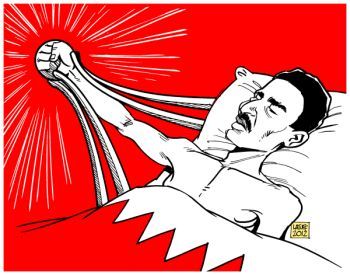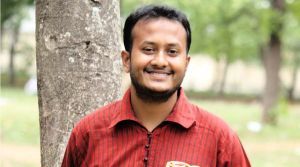
Publisher:
Bonnie King
CONTACT:
Newsroom@Salem-news.com
Advertising:
Adsales@Salem-news.com

~Truth~
~Justice~
~Peace~
TJP
Apr-10-2012 02:03

 TweetFollow @OregonNews
TweetFollow @OregonNews
US: Obama Publicly Call on the Government of Bahrain to Immediately and Unconditionally Release Abdulhadi al-Khawaja
Letter by William Gomes Salem-News.comSalem-News.com Eye on the World report.
 Artwork by Carlos Latuff, friend of Salem-News.com located in Rio de Janeiro. To see more of his work, visit: Latuff Gallery |
(HONG KONG) - Abdulhadi al-Khawaja, a human rights defender and democracy activist in Bahrain, may soon die, as he has been on a hunger strike for more than two months. This, in a country that has been a U.S. ally for years.
Al-Khawaja was arrested one year ago and sentenced to life in prison in June 2011 as part of a group trial of 21 activists and human rights defenders. This group was charged with a range of offenses related to their role in peaceful demonstrations in Bahrain in February and March 2011.
While in detention, al-Khawaja suffered from torture and severe ill-treatment. As a result, he was admitted to the Bahrain Defence Force Hospital in April last year with a cracked jaw and skull requiring several operations on his head and face. in protest of his ongoing detention and mistreatment, al-Khawaja began a hunger strike on February 8. In an open letter to the King of Bahrain, al-Khawaja pledged to stay on hunger strike until “freedom or death.”
International human rights organizations and the Bahrain Independent Commission of Inquiry (BICI) have stated that the trials did not comply with international standards of due process, nor even Bahrain’s own criminal code
Our goal with Eye on the World is to illustrate and highlight politically oriented problems and tragedies that traditional media channels don't have time or interest in covering.
The world has its own set of laws that were agreed upon by the ruling nations in 1948, and many people are not aware of this simple fact. At the root of the concept of world citizenry itself, is the United Nations Universal Declaration of Human Rights, an overriding and supreme law that ensures many essential human rights that governments today fail to observe. Also central to any hope of human success, is the understanding of the human hierarchy of needs, as defined by Abraham Maslow- more information on this at the conclusion of this entry. We must use the Internet as a tool of justice at every junction, and we need to assist all human beings, everywhere, and not allow cultural, racial or religious preferences as determiners.
In his letter to U.S. President Barack Obama, Mr. William Gomes urges this U.S. leader you to publicly call on the Government of Bahrain to immediately and unconditionally release Abdulhadi al-Khawaja, Bahraini human rights defender and democracy activist, from prison. It is important that action is taken and the abuse of this man investigated.
| “ |
Al-Khawaja was arrested one year ago in the wake of popular protests against the Bahraini government, and sentenced to life in prison. While in detention, al-Khawaja suffered from torture and severe ill-treatment. As a result, he was admitted to the Bahrain Defence Force Hospital in April last year with a cracked jaw and skull requiring several operations on his head and face. To protest his ongoing detention and mistreatment, al-Khawaja began a hunger strike on February 8. In an open letter to the King of Bahrain, al-Khawaja pledged to stay on hunger strike until “freedom or death.” After being arrested in April 2011, al-Khawaja was sentenced to life in prison in June 2011 as part of a group trial of 21 activists and human rights defenders. This group was charged with a range of offenses related to their role in peaceful demonstrations in Bahrain in February and March 2011. International human rights organizations and the Bahrain Independent Commission of Inquiry (BICI) have stated that the trials did not comply with international standards of due process, nor even Bahrain’s own criminal code, because the 21 civilians were tried before National Safety Courts, which are military courts. The evidence is clear that al-Khawaja and others were sentenced in violation of their rights to freedom of expression, assembly and association, which are protected under international law. I am deeply concerned about the health of human rights defender Abdulhadi al-Khawaja, and respectfully request that the United States urge the Government of Bahrain to release al-Khawaja immediately, and allow him to travel abroad, including for medical treatment, if he wishes to do so. Thank you for your consideration. |
” |
Maslow's hierarchy of needs
As children we are educated in right and wrong, we are told how to conduct ourselves; we learn both expectations and limitations, and from that point we go forth with these tools, and our individual personalities, and fail or succeed accordingly.
In school we quickly understand that without paper, there is no place to write. Once we have paper, a pen or pencil is required to move to the next point. There is a great analogy that exists between this simple concept of paper and pen, and what we know today as Maslow's hierarchy of needs- the theory in psychology proposed in Abraham Maslow's 1943 paper A Theory of Human Motivation.
He demonstrated how without the correct necessities, a person can do little good for themselves, and has none to offer for others. However when people are housed and have clothing, heat, food, health and security, anything is possible. However if just one of these dynamics is removed from the mix, the chance for success can be adversely affected.
Wikipedia describes Maslow's hierarchy of needs as a pyramid consisting of five levels:
The lowest level is associated with physiological needs, while the uppermost level is associated with self-actualization needs, particularly those related to identity and purpose.
The higher needs in this hierarchy only come into focus when the lower needs in the pyramid are met. Once an individual has moved upwards to the next level, needs in the lower level will no longer be prioritized. If a lower set of needs is no longer be met, the individual will temporarily re-prioritize those needs by focusing attention on the unfulfilled needs, but will not permanently regress to the lower level.
For instance, a businessman at the esteem level who is diagnosed with cancer will spend a great deal of time concentrating on his health (physiological needs), but will continue to value his work performance (esteem needs) and will likely return to work during periods of remission.
And finally, if you care about our efforts, please help us by sending a donation, we seriously need it as ad revenue is very limited, and we aren't doing this to make money. Your support allows our attention to remain with content which is vital. There is a PayPal logo at the top of Salem-News.com. Please help us fight the good fight.
Our PayPal email is bonjtheartists@hotmail.com
Special thanks to William's Desk

Salem-News.com Writer William Nicholas Gomes is a Bangladeshi journalist, human rights activist and author was born on 25 December, 1985 in Dhaka. As an investigative journalist he wrote widely for leading European and Asian media outlets.
He is also active in advocating for free and independent media and journalists’ rights, and is part of the free media movement, Global Independent Media Center – an activist media network for the creation of radical, accurate, and passionate telling of the truth. He worked for Italian news agency Asianews.it from year 2009 to 2011, on that time he was accredited as a free lance journalist by the press information department of Bangladesh. During this time he has reported a notable numbers of reports for the news agency which were translated into Chinese and Italian and quoted by notable number of new outlets all over the world.He, ideologically, identifies himself deeply attached with anarchism. His political views are often characterized as “leftist” or “left-wing,” and he has described himself as an individualist anarchist.
 |
 |
 |
 |
 |
 |
Articles for April 9, 2012 | Articles for April 10, 2012 | Articles for April 11, 2012

Quick Links
DINING
Willamette UniversityGoudy Commons Cafe
Dine on the Queen
Willamette Queen Sternwheeler
MUST SEE SALEM
Oregon Capitol ToursCapitol History Gateway
Willamette River Ride
Willamette Queen Sternwheeler
Historic Home Tours:
Deepwood Museum
The Bush House
Gaiety Hollow Garden
AUCTIONS - APPRAISALS
Auction Masters & AppraisalsCONSTRUCTION SERVICES
Roofing and ContractingSheridan, Ore.
ONLINE SHOPPING
Special Occasion DressesAdvertise with Salem-News
Contact:AdSales@Salem-News.com

Salem-News.com:
googlec507860f6901db00.html

Terms of Service | Privacy Policy
All comments and messages are approved by people and self promotional links or unacceptable comments are denied.
April 10, 2012 11:43 am (Pacific time)
Obama is known to stab our ally in the back, he did it more than once with Israel. No, wait, this is a Muslim Country. Well Mr. Obama, why don't you look at our Country and give the American People their freedom back and follow the Constitution of the United States? Stop worrying about other Nations. You are not capable of taking care of the US how can you take care of the rest of the World? This Country should not be our business, remember not every Country is as liberal and radical as the US right now. Let Bahrain take care of their own problems and start taking care of yours, the survival of the United States (Guess I'll be the first who goes to FEMA Camp for re-education)
Editor: The United States is responsible for what happened in this country. It is significant that we take care of all people, particularly those we have stood up and supported. Make them behave! This man is a hero, he fights for human rights, we need to support him, all Obama has to do is make a phone call.
[Return to Top]©2025 Salem-News.com. All opinions expressed in this article are those of the author and do not necessarily reflect those of Salem-News.com.